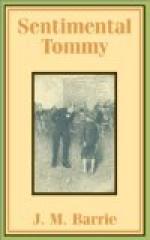At the blackboard was an arithmetic class, slates in hand, each member adding up aloud in turn a row of figures. By and by it was known that Cathro had ceased to listen. “Go on,” his voice rather than himself said, and he accepted Mary Dundas’s trembling assertion that four and seven make ten. Such was the faith in Cathro that even boys who could add promptly turned their eleven into ten, and he did not catch them at it. So obviously was his mind as well as his gaze on, something beyond, that Sandy Riach, a wit who had been waiting his chance for years, snapped at it now, and roared “Ten and eleven, nineteen” ("Go on,” said Cathro), “and four, twenty,” gasped Sandy, “and eight, sixteen,” he added, gaining courage. “Very good,” nmrmured the Dominie, whereupon Sandy clenched his reputation forever by saying, in one glorious mouthful, “and six, eleven, and two, five, and one, nocht.”
There was no laughing at it then (though Sandy held a levee in the evening), they were all so stricken with amazement. By one movement they swung round to see what had fascinated Cathro, and the other classes doing likewise, Tommy became suddenly the centre of observation. Big tears were slinking down his face, and falling on some sheets of paper, which emotion prevented his concealing. Anon the unusual stillness in the school made him look up, but he was dazed, like one uncertain of his whereabouts, and he blinked rapidly to clear his eyes, as a bird shakes water from its wings.
Mr. Cathro first uttered what was afterward described as a kind of throttled skirl, and then he roared “Come here!” whereupon Tommy stepped forward heavily, and tried, as commanded, to come to his senses, but it was not easy to make so long a journey in a moment, and several times, as he seemed about to conquer his fears, a wave of feeling set them flowing again.
“Take your time,” said Mr. Cathro, grimly, “I can wait,” and this had such a helpful effect that Tommy was able presently to speak up for his misdeeds. They consisted of some letters written at home but brought to the school for private reading, and the Dominie got a nasty jar when he saw that they were all signed “Betsy Grieve.” Miss Betsy Grieve, servant to Mr. Duthie, was about to marry, and these letters were acknowledgments of wedding presents. Now, Mr. Cathro had written similar letters for Betsy only a few days before.
“Did she ask you to write these for her?” he demanded, fuming, and Tommy replied demurely that she had. He could not help adding, though he felt the unwisdom of it, “She got some other body to do them first, but his letters didna satisfy her.”
“Oh!” said Mr. Cathro, and it was such a vicious oh that Tommy squeaked tremblingly, “I dinna know who he was.”




